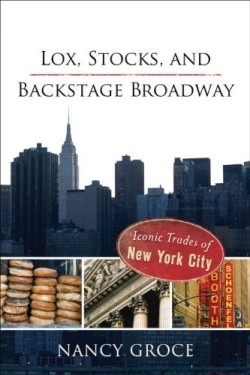Lox, Stocks, and Backstage Broadway
Iconic Trades of New York City
Millions of people in New York City means millions of stories. Some of the stories we know-those of famous actors, bankers, philanthropists, and scores of other people who made themselves great in the Big Apple. But what about the people we never read about or see on a large screen? What about those who toil underneath the streets operating MTA trains, or behind the stages on Broadway making scenery and wigs, or on the floors of the New York Stock Exchange?
These are the stories that folklorists with the Smithsonian’s New York City Project set out to record and include in the 2001 Smithsonian Folklife Festival in Washington, DC; these are the stories that make the resulting book, Lox, Stocks and Backstage Broadway, hard to put aside until the final page. Author Nancy Groce has arranged snippets of interviews among detailed historical and cultural contexts to create a riveting collection of characters. These professionals are fascinating not despite their lack of fame but because of it; in a few key ways, they are just like us.
“Thousands upon thousands of huge wooden barrels are perched like alien spaceships on rooftops throughout the city. It’s impossible to imagine the cityscape without them, but it’s also possible that you’ve never noticed them,” Groce writes. Over half of New York City’s water tanks were constructed by Rosenwach Water Tanks, which has been owned by the same family since 1896. Many of owner Andrew Rosenwach’s employees have been with him for many years; some are descendants of men who worked for Rosenwach Water Tanks in previous decades. These are the people who tower above the city on any given day, no matter the temperature, to install or repair the tanks that provide water to buildings over six stories tall. Who knew they were up there?
Rosenwach workers tell stories of witnessing a celebrity rooftop wedding, of important learning moments masked as practical jokes, and of the ultimate trust they have in each other. When you’re hanging over the edge of a building, with nothing below you but a far-away sidewalk, you want to know that the man holding you around the waist can do his job.
This sense of trust can be found above the stages on Broadway as well. While the audience may be privy only to the action in front of the lights, a flurry of activity behind and above the scenes ensures that the actors can deliver their lines to the best of their talents. In addition to interviews of costume makers, wig makers, and set designers, Groce includes stories from stagehands like John Loftgren, whose family has worked in this business for the past three generations. These workers deserve respect: “What a lot of actors don’t realize is that stagehands are technicians. And you’re doing some very critical thingsÂ…Like Beauty and the Beast-there’s eighty thousand pounds of scenery hanging over that stageÂ…And it’s moving!”
History plays a leading role in many of the professions Groce includes in her book. “In the course of our interviews, we found it interesting that many of our Wall Street informants began their narratives chronologically by telling us stories about the early history of the Financial District.” Whether they’re spouting details about the Buttonwood Agreement or admiring the longtime letter code used for buying and selling futures, traders are well-aware of their place in history; those who’ve followed in the footsteps of parents and grandparents perhaps most of all.
Whether Groce is writing about day traders who wear silly hats, train conductors trying to deal with suicides on the tracks, or wig makers who produce the wigs for Saturday Night Live, her prose is respectful and, most importantly, entertaining. One of her great strengths as a writer is knowing when to get out of the way of words of the interviewees; she has a knack for perfectly balancing context with what workers have to say about themselves, their jobs, their families, and their city.
Sheet metal workers, train conductors, chorus members, graffiti artists-the people who speak in Lox, Stocks, and Backstage Broadway are widely different, but they share many common traits: a sense of community, an acknowledgment of the history of their trades, and an abiding pride in their work. (January) Andi Diehn
Disclosure: This article is not an endorsement, but a review. The publisher of this book provided free copies of the book to have their book reviewed by a professional reviewer. No fee was paid by the publisher for this review. Foreword Reviews only recommends books that we love. Foreword Magazine, Inc. is disclosing this in accordance with the Federal Trade Commission’s 16 CFR, Part 255.

